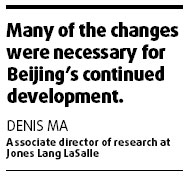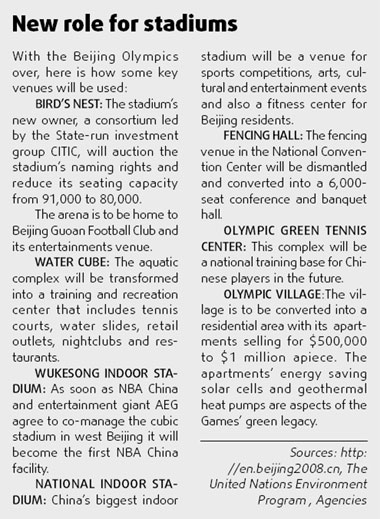Beijing's huge investment in the Olympics will help cement its place as a world-class city and business center, and leave a legacy of improvements for its residents, pundits have said.
Unlike Athens and some other previous hosts, where the Games led to a mountain of debt and many of the venues now sit unused, Beijing and the Chinese government can comfortably afford the $40 billion bill, they said.
Denis Ma, associate director of research at the Beijing office of property consultants Jones Lang LaSalle, said the main thing was that less than a quarter of the total spend was on purpose-built venues such as the Bird's Nest stadium. The bulk was invested in infrastructure.
"Many of the changes were necessary for Beijing's continued development. The Olympics just served to accelerate their implementation," Ma said.
The extension of the subway network will not only help reduce vehicle emissions, but allow for the development of new residential hubs, he said.

Jing Ulrich, chairman of China equities at J P Morgan Securities, said the investment would have long-term benefits.
"With an improved transport system, financial services infrastructure, communications network and hospitality industry, post-Olympics Beijing will be better positioned to fulfill its potential as a world-class metropolis," he said in a report.
The city is also confident of a bright future for its newly built stadiums.
The new operators of the Bird's Nest, a consortium led by state investment group CITIC, plan to sell naming rights and make it home to one of Beijing's professional soccer clubs, with a complex of hotels, restaurants and shops built around it.
AEG Worldwide, a US sports and entertainment management firm hoping to tap into a post-Olympics boom, has already teamed up with the National Basketball Association's NBA China to secure the rights to manage the Wukesong indoor stadium, which staged the basketball competition.
AEG is also looking at staging events at the Bird's Nest.
"We're interested in the Bird's Nest, and are confident we can fill it occasionally," Tim Leiweke, president and CEO of AEG said recently.
Zou Huan, a professor of urban planning at Beijing's Tsinghua University, said the way in which the Games sparked the development of new public spaces in the city was also significant.
Not only will the Olympic Green likely rival Tian'anmen Square as a prime destination for tourists, but the many new parks and green spaces will give ordinary Beijinger a break from their often cramped living conditions, he said.
"They resemble European city squares in the sense of how they give people a space outdoors to chat and meet. That's very useful, and it's changing city life," Zou said.
Ideally, officials would have had more time to carry out their plans, and paid more attention to detail, to avoid sacrificing some buildings of historical value, he said.
Thousands of people were also forced to move to make way for the venues, parks and light rail lines.
"But you have to look at the costs and benefits," Zou said.
"Overall, I think the gains for Beijing's urban landscape are more important."
Agencies

(China Daily 08/26/2008 page4)